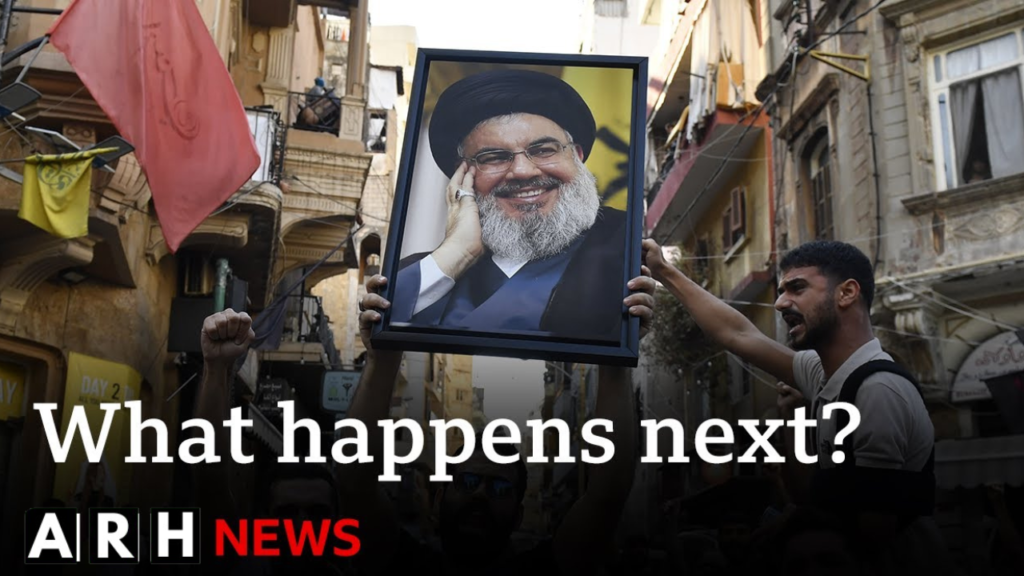The Escalating Tensions Between Hezbollah, Israel, and Iran: What Might Happen Next?
The assassination of Hassan Nasrallah, the long-standing leader of Hezbollah, by Israel has sent shockwaves through the Middle East. This major escalation in the ongoing conflict between Hezbollah and Israel has the potential to pull in other key players in the region, including Iran and the United States.
As the dust settles from this latest development, the critical question remains: what might Hezbollah, Israel, and Iran do next? The potential for a much wider and more damaging regional conflict looms large, and the actions taken by these three key players will be pivotal in determining the path forward.
Hezbollah’s Response: Vengeance or Restraint?

Hezbollah’s command structure has been severely disrupted by Nasrallah’s assassination, with its communications sabotaged and many of its weapons destroyed by Israeli airstrikes. However, the group has vowed to carry on fighting Israel, and there will be immense pressure within its ranks to seek revenge.
Hezbollah still maintains a large arsenal of missiles, many of which can reach Tel Aviv. There will be calls from hardliners within the organization to unleash a massive attack using these weapons, in an effort to strike a blow against Israel and avenge Nasrallah’s death. However, such a move would almost certainly provoke a devastating response from Israel, which could wreak havoc on Lebanon or even target Iran.
The group’s leadership will need to carefully weigh the potential consequences of any retaliatory action. While the desire for vengeance may be strong, Hezbollah will likely seek to calibrate its response in a way that avoids triggering a full-scale war that it cannot win. Restraint and a more measured approach may ultimately prevail, as the group seeks to regroup and rebuild its capabilities in the aftermath of this devastating blow.
Israel’s Relentless Campaign: Pushing Hezbollah to the Brink?
Israel has made it clear that it has no intention of pausing its military campaign against Hezbollah. Emboldened by the assassination of Nasrallah and the apparent weakening of the group, Israel is determined to press on with its efforts to remove the threat posed by Hezbollah’s missile arsenal.
The Israeli military has been training for a potential ground invasion of Lebanon, and many analysts believe that such a move is almost inevitable. The priority for Israel will be to find and destroy the remaining missiles, many of which are believed to be hidden underground. While going in may be relatively easy, the challenge will be in getting out, as the experience in Gaza has shown.
Israel’s relentless campaign against Hezbollah is driven by a belief that it has the group on the back foot and can capitalize on this momentum to deliver a decisive blow. However, the risks of a ground invasion are significant, as the 2006 war demonstrated. Hezbollah, despite its recent setbacks, remains a formidable force, with thousands of experienced fighters and a deep well of support within Lebanon.
The potential for a prolonged and bloody conflict looms large, and Israel will need to carefully weigh the potential costs and benefits of any further escalation. The political calculus may also be influenced by the upcoming US presidential election, with the Biden administration potentially taking a different approach than the Trump administration’s staunch support for Israel.
Iran’s Dilemma: Balancing Retaliation and Restraint

The assassination of Nasrallah is as much a blow to Iran as it is to Hezbollah. Iran has already announced five days of mourning and rallies across the country, and hardliners within the regime will be pushing for a response to this latest “humiliation” by Israel.
Iran has a vast network of allied militias across the Middle East, including the Houthis in Yemen and armed groups in Syria and Iraq. The Islamic Republic could potentially ask these proxies to step up their attacks on both Israel and US bases in the region, as a means of retaliating against the killing of Nasrallah.
However, Iran will likely seek to calibrate its response in a way that avoids triggering a full-scale war that it cannot win. The country is already facing significant economic and political challenges, and a direct confrontation with Israel and the United States would be a risky and potentially disastrous move.
Instead, Iran may opt for a more measured approach, using its network of proxies to carry out targeted attacks that stop short of provoking a massive military response. The goal would be to send a message and demonstrate its ability to retaliate, without crossing the line into all-out war.
At the same time, Iran will likely take steps to protect its own leadership, including Ayatollah Khamenei, in case they too become targets of assassination. The loss of Nasrallah has been a significant blow, and Iran will be acutely aware of the need to safeguard its remaining key figures.
The Potential for a Wider Regional Conflict
The actions taken by Hezbollah, Israel, and Iran in the coming days and weeks will be crucial in determining whether the region slides into a much wider and more damaging conflict. The stakes are high, and the potential for miscalculation or escalation is significant.
- Hezbollah will need to carefully balance its desire for vengeance with the need to avoid triggering a devastating Israeli response that could devastate Lebanon.
- Israel will likely continue its relentless campaign against Hezbollah, potentially even launching a ground invasion, in an effort to eliminate the threat posed by the group’s missile arsenal.
- Iran will need to decide how to respond, potentially using its network of proxies to carry out targeted attacks, while avoiding a direct confrontation that it cannot win.
The involvement of the United States, as Israel’s staunchest ally, adds another layer of complexity to the situation. The upcoming US presidential election could also influence the dynamics, with a potential shift in policy under a Biden administration.
Ultimately, the path forward will depend on the ability of these key players to navigate the treacherous landscape of the Middle East, balancing their competing interests and aspirations while avoiding the outbreak of a wider regional conflict. The stakes could not be higher, and the consequences of miscalculation could be catastrophic.







The Escalating Tensions Between Hezbollah, Israel, and Iran